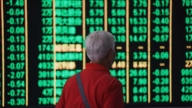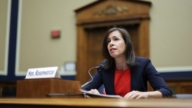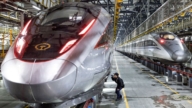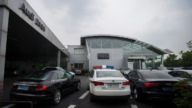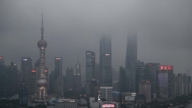【新唐人2013年10月05日讯】随着“亚太自由贸易区”和“欧美自由贸易区”的推动,中国将完全被屏蔽在国际贸易区之外。为此习李当局急忙推出上海自由贸易实验区,以应对国际游戏规则这种颠覆性的变化。不过,尽管上海自贸区已经开业,外界并不看好,因为已经出炉的措施没有新意,而操作细节又迟迟不出,外界比喻上海自贸区是“潮湿了的爆竹”——难响。
英国媒体的报导写道,上海自由贸易试验区成立前后的几天,诸多迹象令人感到这像一枚“潮湿的爆竹”。文章说,最明显的例子是,外界寄予相当期望的利率自由化和人民币自由兑换,实际上,传递了明确的反向信息,当局承诺将制订各式各样的新规则、定额和行政管控措施,体现了官员们对“热钱”经由自贸区离境的高度担忧。
香港媒体认为自贸区“雷声大,雨点小”,自贸区的“负面清单”与今年3月由国家发改委和商务部公布的《外商投资产业指导目录》相比较,几乎没有差别。
上海自贸区正式成立后的第二天就公布了一份包括近200项内容,涉及18个行业的外资投资限制清单,要求外资投资比例不能超过51%。美国《华尔街日报》表示,这份“负面清单”可能令该试验区对全球企业的吸引力大打折扣。
中国金融智库研究员巩胜利:“它还有一些法律,什么《银行法》、《电信法》都规定了,比如《银行法》规定外资比例不能超25%,像这样的电信金融产业人家不能投资,全世界的的法治国家没有这样的先例,所以这个上海自由贸易区能走到什么程度,还是个未知数,那不走也麻烦,走也麻烦,这就是中国经济的两难。”
中国金融智库研究员巩胜利受命参加过上海自贸区调研,他认为,自贸区在法律和体制方面的阻力非常大。
巩胜利:“税率不解决可能是上海自由贸易区的最大的关键点,全国的实行的税率大概是25%,调研的时候说是把这个税率降到15%,昨天,中国(共)国家财政部发文说,贸易区的税率暂不做调整,税率如果不调整,吸引外资可能就存在一些问题。”
对迟迟不出台的自贸区具体运作、开放程度等细节,香港媒体分析指出,关键在于中央或各部门对其发展内容存在极大分歧,相信短期内也不会有结果。
北京天则经济研究所副所长冯兴元:“所有不符合的自由贸易区的规定,都要在自由贸易区内失效,然后建立新的规则,是这样倒着推的,那个对各个部门,既得利益者冲击巨大。”
巩胜利还透露,因为人民币和所有的国际货币都不兼容,李克强试图在上海自由贸易试验区,摸索出一条人民币自由兑换或者兼容的路子来。不过,巩胜利指出,目前中国经济还是靠投资来拉动。
到今年6月底,中国货币的发放量已经超过106万亿,而一些垄断的产业对内对外都不开放。巩胜利表示,如果上海自贸区失败,10月底,占全球经济80%的“亚太自由贸易区(TPP)”,和“欧美自由贸易区(TTIP)”上路后,中国经济将逐渐走向崩溃。
巩胜利:“有一个看点很值得关注,它是不是按照市场经济地位的方式来运行,还有共产党要不要在试验区设立管制机构,比如设个中国上海自由贸易试验区党委,可能要等到十三届三中全会,可能要给个定义。”
美国南卡罗莱纳大学艾肯商学院教授谢田,在接受《新唐人》采访时曾经指出,人民币在上海自贸区自由兑换,要提防中共官员及利益集团利用来合理洗钱。一旦资本大规模流出,必然带来人民币资产价格下跌,中国股市、债市、和房市都会因此而崩盘。
采访编辑/刘惠 后制/李智远
Shanghai Free Trade Zone: A Damp Squib
Following the Asia-Pacific Free Trade Zone and EU-US Free
Trade Zone’s carrying forward, China had been marginalized.
In response, Xi Jinping launched a pilot free trading
zone in Shanghai.
Although the Shanghai Free Trade Zone (FTZ)
has officially opened, outsiders are not optimistic.
The regulations are not new,
And details of operation have been delayed.
It was said that the Shanghai FTZ was like
a damp squib – it cannot fire-up.
UK’s BBC Chinese version website said that on the
evidence presented so far, the Shanghai FTZ is a damp squib.
The article states that the most obvious example is the
free exchanging of yuan and liberalizing interest rates
are unlikely to happen.
All manner of the new regulations, quotas and
bureaucratic controls that the regime promised
reflect that officials fear that the “hot money” will leave
China through the new zone.
Hong Kong’s media believe that the new zone is like
loud thunder with very little rain.
Comparing the “negative list” of the Shanghai FTZ with the
“Catalogue for the Guidance of Industries for
Foreign Investment” published in March show very little change.
A day after the Shanghai FTZ officially opened, the regime
announced nearly 200 restrictions on foreign investment.
Among them, 18 industries restrict on foreign investment,
requiring that the proportion of foreign investment
cannot exceed 51%.
Wall Street Journal states that the list could make the
venture far less attractive to global companies.
Gong Shengli, a researcher at the China Financial Intelligence
Unit: It also launched some laws,
Banking Law and a Telecommunications Act.
The Banking Law states foreign investment cannot exceed 25%.
Thus investors will not invest in
the telecommunication industry.
There is no such example in the entire world.
How far the Shanghai FTZ can go is unknown.
To carry on, the Shanghai FTZ, will have trouble,
without carrying on it will also bring trouble.
This is the difficult situation in China’s economy.
Gong Shengli had attended the Shanghai FTZ research, he said
that the new zone had faced great difficulty in legal areas
and the regime’s system.
Gong Shengli: The tax rate issue will be the biggest problem
if it cannot be resolved.
The standard tax rate is 25%, during the research,
they said it will reduce to 10% for the Shanghai FTZ.
Yesterday, the Ministry of Finance said that the Shanghai FTZ
tax rate will remain temporarily unchanged.
However, if this is so, it will be a problem
in attracting foreign investment.
The details of operation are delayed, Hong Kong’s media
analyzed that the central regime had a big disagreement
over the Shanghai FTZs development content.
They said it unlikely to be resolved
in a short period of time.
Feng Xingyuan, deputy director, Unirule Institute of
Economics, Beijing: Any regulation not suited for the
free trade zone, will fail in the new zone.
Then they set up new regulations, that
has brought a huge impact to interest groups.
Gong Shengli revealed that the RMB is not convertible,
Li Keqiang intended to find a way to make it
convertible in the Shanghai FTZ.
Gong said, now China’s current economic situation
relies on investment.
In June, China’s money supply exceeded
106 trillion yuan ($17.3 trillion),
Some monopoly industries are open
neither externally nor internally.
Gong Shengli said that if the Shanghia FTZ fails,
by the end of October, the Asia-Pacific Free Trade Zone and
the EU-US Free Trade Zone, which will make up 80% of the
global economy, China’s economy will gradually collapse.
Gong shengli: One point is worthy of attention,
whether the new zone will operate in accordance with
market economic status?
Whether the CCP will set up a monitoring system
in the new zone?
For example, to establish a free trade zone committee,
it will be decided in 3rd Plenary Session.
Xie Tian, Professor at the Aiken Business School,
University of South Carolina told NTD that allowing the free
exchanging of yuan in the Shanghai FTZ, need to be cautious of
CCP officials using it to legally launder money.
If funds outflow on a large-scale, it will inevitably bring
the yuan related assets price down.
China’s stock market, bond market, and the housing market
will therefore collapse.


